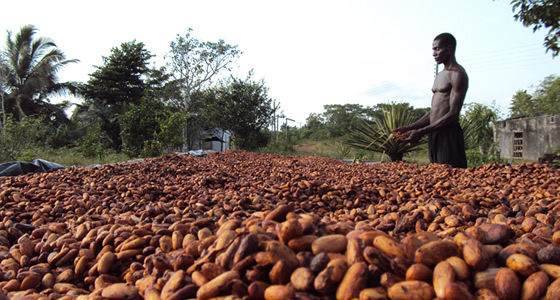 The technical committees of the Ghana-Cote d’Ivoire Joint Co-operation on Cocoa has begun a two-day meeting in Accra to discuss how to enhance farm level productivity, marketing and issues of interest in international affairs.
The technical committees of the Ghana-Cote d’Ivoire Joint Co-operation on Cocoa has begun a two-day meeting in Accra to discuss how to enhance farm level productivity, marketing and issues of interest in international affairs.
The meeting comes on the back of low cocoa prices on the international market and it is expected to devise strategies for mitigating the harsh effects of declining prices on cocoa farmers.
It will also explore ways to build resilient and robust cocoa sectors capable or rendering appreciable and sustainable benefits to farmers and the economies of the two countries.
Addressing the opening session, Dr Owusu Afriyie Akoto, the Minister of Food and Agriculture, said the absence of appreciable rise in demand to increase prices was threatening the sustainability of cocoa production.
This, he said, called for urgent, effective and sustainable measures to first protect the farmers and the economies from the harsh effects of the price falls and chart a future path of greater self-reliance.
“The solutions to this and other challenges of the cocoa sector require co-operative efforts among producers, especially the two largest,” he said.
Ghana and Cote d’Ivoire produces about 2.35 million tonnes of cocoa, which is about 60 per cent of world production.
Dr Akoto said the co-operation presented an opportunity to harness resources, synergise strategies and march forward with the common objective of improving the welfare of cocoa farmers and the economies at large.
He said the enhancement of the welfare of cocoa farmers would require an improvement in farm productivity, sustainable domestic and international prices and a stronger producer organisation to ensure that the interest of farmers and producer countries was catered for while fostering a competitive domestic downstream sector.
Dr Akoto said expanding the downstream sector and increasing consumption of cocoa domestically were among the urgent steps to ensure the market equilibrium required to achieve remunerative producer price.
He said increased domestic consumption would spur increased cocoa processing locally and provide the opportunity to industrialise and diversify the economies, create job and generate revenues for social and economic development.
“Our aim should be to gradually move to the end of the value chain, such as the production of confectionaries, in order to realise the maximum gains and other related benefits that this process will catalyse,” he said.
The Minister expressed government’s commitment to the technical co-operation for sustainable cocoa economy.
Mr Joseph Boahen Aidoo, the Chief Executive of Ghana Cocoa Board, said as leading producers Ghana and Cote d’Ivoire needed to collaborate towards harmonised production and marketing arrangements.
He expressed the hope that the meeting would lay strong foundation for the attainment of a harmonised system and deepen the collaboration as the way forward.
“We deem this bilateral relationship as a necessity because pests and diseases do not know national boundaries,” Mr Aidoo said.
He tasked the three Technical Committees to take advantage of the close socio-cultural and environmental backgrounds of the two countries to fashion out the best strategies for mutual benefit.
Key issues to look at include research, provision of planting materials, extension, pest and disease control, as well as quality assurance and marketing structures.
Mr Aidoo said Ghana would take advantage of the co-operation to fashion out sustainable strategies to help stem illegal cross-border trading activities between the two countries.
Mrs Massandje Toure-Litse, the Director-General of Conseil du Cafe-Cacao Cote d’Ivoire, expressed the hope that the technical committee would come out with proposals to meet the challenges.
Source: GNA























